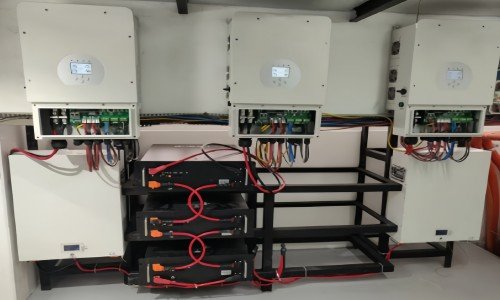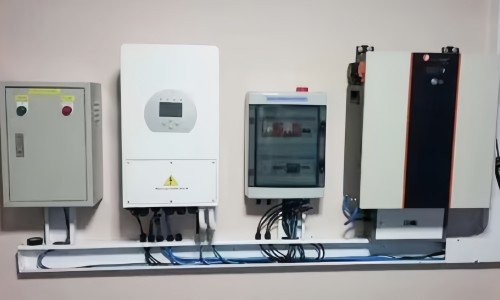
Rooftop solar panels
When selecting a hybrid inverter for your solar energy system, two of the most well-known brands are Deye and Huawei. Both offer high-quality inverters with advanced features and reliability. However, deciding between them can be difficult without understanding the key differences in performance, cost, integration, and after-sales support. In this article, we’ll compare Deye and Huawei inverters across several important factors to help you make an informed decision.
Deye and Huawei inverters offer advanced technologies, but each brand brings unique strengths. Let’s dive into the comparison and see which one suits your needs better.
Table of Contents
- What Are the Key Differences in Performance?
- Which Inverter Offers Better Integration with Solar Systems?
- How Do Deye and Huawei Compare in Terms of Cost?
- Which Inverter Provides More Reliable After-Sales Support?
What Are the Key Differences in Performance?
Both Deye and Huawei offer high-performance inverters, but there are some differences in terms of efficiency, power output, and features. Understanding these differences can help you decide which inverter will work best for your solar system.
Performance is one of the most important factors when choosing an inverter. Let’s compare how Deye and Huawei inverters stack up in terms of key performance metrics.

Huawei inverter installation
Deye vs Huawei: Performance Comparison
| Inverter Model | Deye SUN-3.6/5/6K-SG03LP1-EU | Huawei SUN2000-5KTL-L1 |
|---|---|---|
| Efficiency | 98.4% | 98.6% |
| Max Output Power | 6 kW | 5 kW |
| AC Output | 1-phase or 3-phase | 1-phase or 3-phase |
| Battery Compatibility | LiFePO4, LFP | Huawei FusionStorage (Li-ion) |
| IP Rating | IP65 | IP65 |
| Warranty | 5–10 years | 5–10 years |
| Operating Temp. Range | -25°C to +60°C | -25°C to +60°C |
-
Efficiency:
- Deye: Deye inverters are known for their high efficiency (up to 98.4%) and stable performance. While slightly lower than Huawei's, this still offers a high level of energy conversion.
- Huawei: Huawei inverters boast slightly higher efficiency at 98.6%, ensuring optimal energy conversion. This can result in better energy yields, especially in high-performance applications.
-
Power Output:
- Deye: Deye offers higher output power (up to 6kW), which is beneficial for larger homes or small commercial setups.
- Huawei: Huawei offers a 5kW inverter model, which is typically more than sufficient for residential systems but may not be ideal for larger commercial installations without parallel inverters.
-
Battery Compatibility:
- Deye: Deye inverters are compatible with LiFePO4 and LFP batteries, giving users flexibility in choosing their energy storage solution.
- Huawei: Huawei inverters are optimized to work with their FusionStorage1 Li-ion battery system, providing seamless integration and better performance with Huawei's own storage solutions.
-
IP Rating:
-
Warranty:
Conclusion: Huawei slightly edges out Deye in terms of efficiency, but Deye offers a higher output power, making it a better choice for larger installations. Huawei’s superior battery integration makes it a good option if you’re using Huawei storage solutions.
Which Inverter Offers Better Integration with Solar Systems?
When choosing a hybrid inverter, integration with other system components—such as solar panels, batteries, and monitoring systems—is a key consideration. Both Deye and Huawei provide excellent integration capabilities, but the overall ease of use and compatibility with different components vary.
Inverter integration can significantly affect the system’s efficiency, scalability, and monitoring capabilities. Let’s compare Deye and Huawei in terms of integration.

Deye inverters and batteries
Which Inverter Offers Better Integration with Solar Systems?
When choosing a hybrid inverter, integration with other system components—such as solar panels, batteries, and monitoring systems—is a key consideration. Both Deye and Huawei provide excellent integration capabilities, but the overall ease of use and compatibility with different components vary.
Inverter integration can significantly affect the system’s efficiency, scalability, and monitoring capabilities. Let’s compare Deye and Huawei in terms of integration.

Deye inverter components
Deye vs Huawei: Integration with Solar Systems
-
Deye Integration:
- Deye inverters are highly compatible with both residential and commercial solar panels and battery systems, particularly LiFePO4 and LFP batteries. They offer flexible integration and come with comprehensive monitoring systems, which allow users to track performance via apps or web portals.
- The integration with other systems is typically seamless, especially when using standard solar panels and batteries. However, Deye does not have its own proprietary battery system, which may require additional compatibility checks.
-
Huawei Integration:
- Huawei inverters are optimized for use with their own FusionStorage battery systems, which ensures seamless integration and communication between the inverter and the storage system. Huawei’s inverters also come with excellent smart monitoring and optimization features via their FusionSolar4 platform, making it easy for users to monitor and control their systems.
- Huawei’s Smart PV platform also supports AI-powered5 diagnostics and energy optimization, which can provide better efficiency, especially for large-scale installations.
Conclusion: Huawei offers better integration with its proprietary FusionStorage battery and smart monitoring platform, making it an excellent choice if you want an all-in-one solution. Deye, on the other hand, offers broader compatibility with other storage solutions but lacks the seamless integration found with Huawei’s proprietary systems.
How Do Deye and Huawei Compare in Terms of Cost?
Cost is a significant factor when deciding between Deye and Huawei inverters. Both brands offer competitive pricing, but the cost can vary based on the features, efficiency1, and warranty offered.
Cost-effectiveness is key for both residential and commercial solar installations. Let’s compare the pricing of Deye and Huawei inverters.

Solar inverter setup
Deye vs Huawei: Cost Comparison
| Inverter Model | Deye SUN-3.6/5/6K-SG03LP1-EU | Huawei SUN2000-5KTL-L1 |
|---|---|---|
| Initial Price | $1,200 – $1,500 | $1,300 – $1,600 |
| Efficiency | 98.4% | 98.6% |
| Payback Period | 5–6 years | 4–5 years |
| Warranty | 5–10 years | 5 years |
-
Initial Price:
- Deye: Deye inverters tend to be more affordable, with initial prices ranging from $1,200 to $1,500, depending on the model and region. They offer great value for the price, especially for larger systems.
- Huawei: Huawei inverters are priced slightly higher, ranging from $1,300 to $1,600. The higher price reflects the advanced features, better integration with Huawei’s energy storage systems6, and higher efficiency.
-
Payback Period:
- Deye: Deye inverters offer a competitive payback period, usually between 5 and 6 years. The high efficiency and performance ensure that the upfront cost is quickly offset by the energy savings over time.
- Huawei: Huawei inverters offer a slightly shorter payback period, typically around 4 to 5 years, thanks to the higher efficiency and advanced features, which lead to greater energy production and savings.
Conclusion: Deye inverters are more cost-effective upfront, making them a good choice for those with a smaller budget. Huawei offers a slightly higher initial investment but can provide a quicker payback period due to better overall efficiency.
Which Inverter Provides More Reliable After-Sales Support?
After-sales support is an important factor when selecting a hybrid inverter, as issues may arise during installation or operation. Both Deye and Huawei offer warranties, customer service, and technical support, but there are differences in the level of service provided.
Reliable after-sales support ensures that you have the assistance you need if anything goes wrong with your inverter. Let’s compare Deye and Huawei in terms of after-sales support.
Deye vs Huawei: After-Sales Support Comparison
-
Deye Support:
- Deye offers strong after-sales support with a 5 to 10-year warranty, depending on the model. The company provides technical assistance, troubleshooting, and repair services via their local distributors and service centers.
- Deye also offers remote monitoring and support via their app or web portal, allowing users to quickly diagnose and resolve issues.
-
Huawei Support:
- Huawei is known for its excellent customer service and after-sales support. They offer a 5-year warranty and provide comprehensive technical assistance through a global network of service centers.
- Huawei’s Smart PV platform7 allows for AI-powered diagnostics and troubleshooting, ensuring that issues are identified and addressed quickly.
Conclusion: Huawei offers more comprehensive after-sales support, especially with its Smart PV platform and AI-powered diagnostics. However, Deye also provides strong support through its warranty and remote monitoring services.
-
FusionStorage is Huawei’s proprietary energy storage solution. It is optimized for seamless integration with Huawei’s solar inverters and offers superior performance. ↩ ↩
-
The IP65 rating means the inverter is highly resistant to dust and water ingress, making it suitable for outdoor use in all weather conditions. ↩
-
The warranty period typically covers the inverter's performance and any defects, ensuring protection against faults and issues for the duration of the warranty. ↩
-
FusionSolar is Huawei's smart PV platform that provides advanced monitoring, diagnostics, and optimization for solar systems, enhancing system performance. ↩
-
AI-powered energy optimization uses artificial intelligence to analyze data and adjust system parameters to maximize energy output and system performance. ↩
-
Energy storage systems – These systems are designed to store excess energy generated by solar power for later use, typically during periods of low sunlight or high demand. Huawei’s integration with energy storage systems makes it a better option for long-term savings and energy optimization. ↩
-
Smart PV platform Huawei’s Smart PV platform uses AI technology to diagnose and troubleshoot inverter issues remotely, helping to improve the reliability and speed of service requests. This platform is integral in providing fast, efficient support to users, ensuring the inverter operates optimally with minimal downtime. ↩



